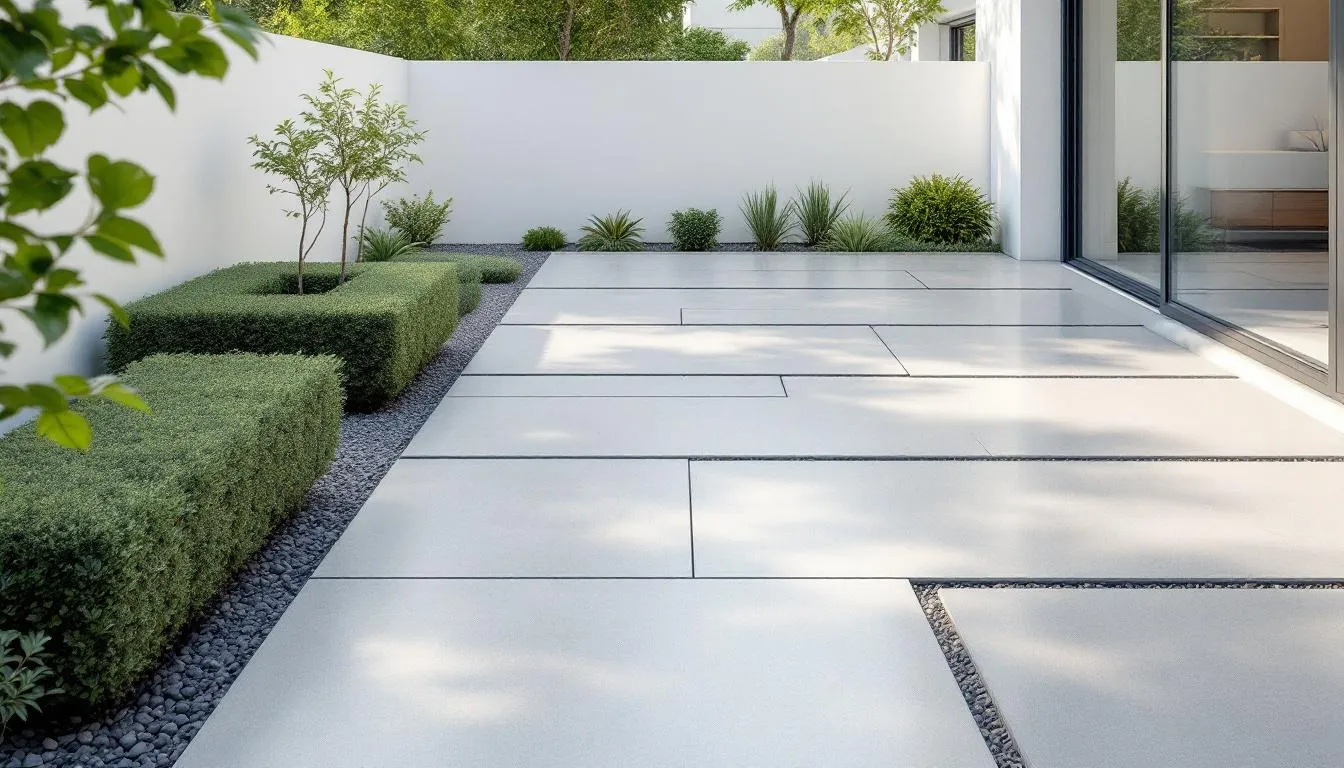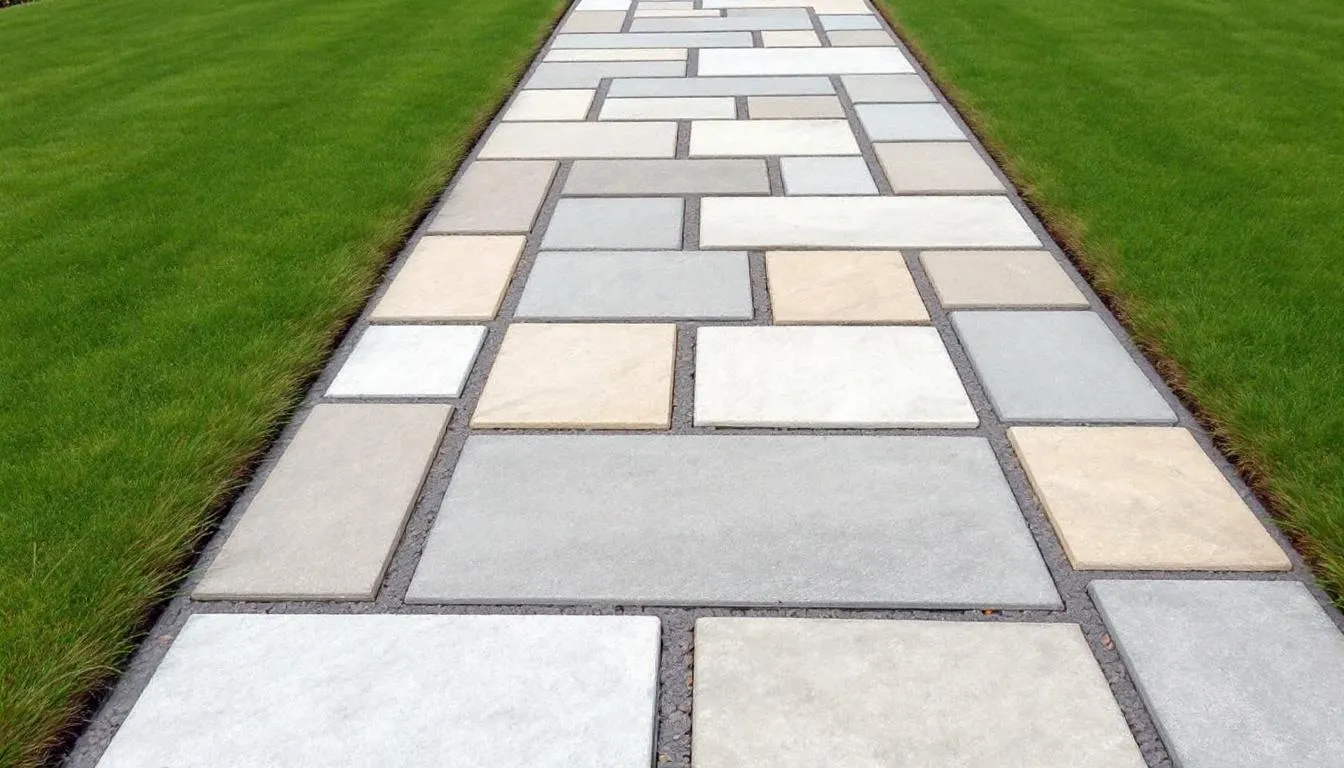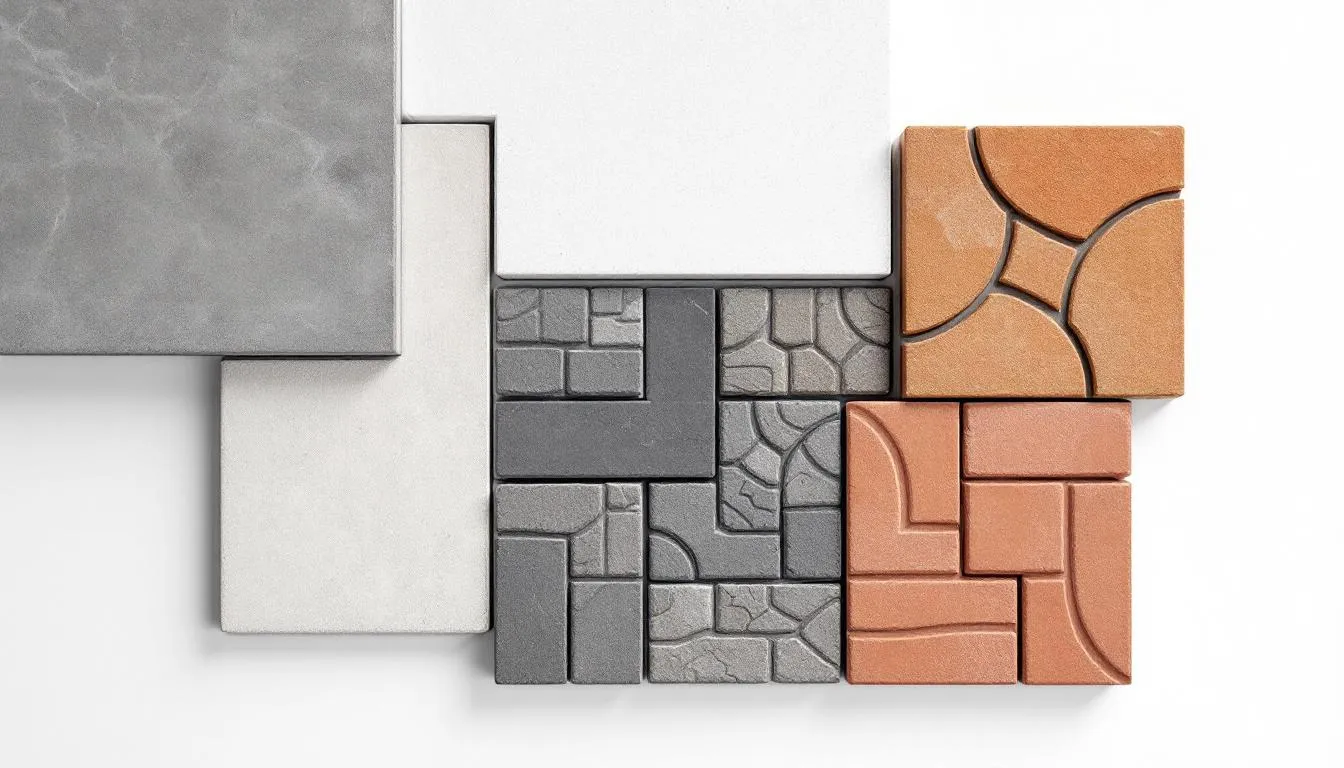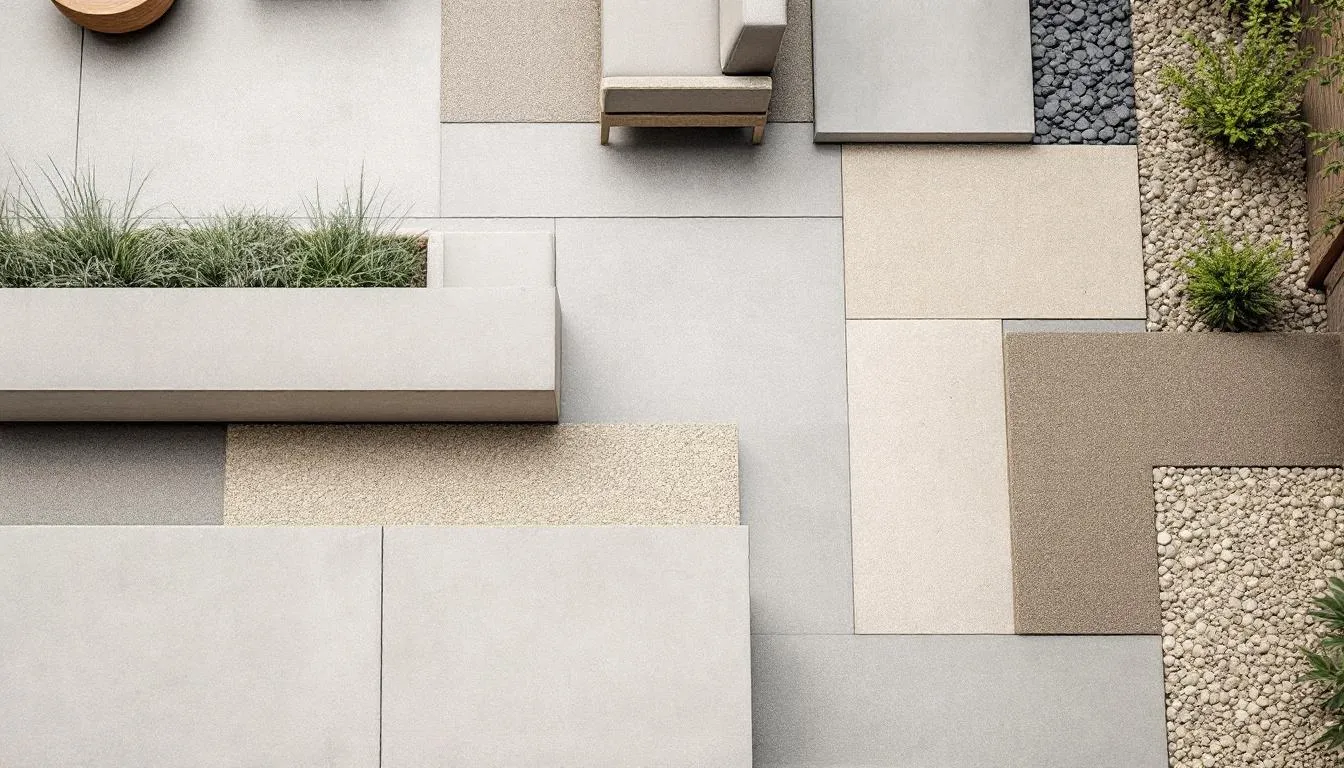
Not sure whether to choose porcelain vs natural stone paving for your outdoor space? This guide compares their durability, maintenance, aesthetics, and cost to help you decide.
Key Takeaways
-
Porcelain paving offers high durability, low maintenance, and a wide variety of design options, making it ideal for outdoor spaces.
-
Natural stone paving, with its unique aesthetics and character, requires regular maintenance to preserve its appearance but is favoured for its classic appeal.
-
Cost analysis reveals that while both materials have similar installation costs, porcelain provides long-term value through minimal upkeep compared to natural stone.
Understanding Porcelain Paving

Porcelain paving is renowned for its remarkable durability and low-maintenance nature. Created by combining refined clay and minerals, which are then pressed and fired at high temperatures, porcelain paving results in a dense and durable material that can withstand heavy outdoor use. This manufacturing process, known as vitrification, ensures that the tiles are resistant to stains, frost, and scratches, making them an ideal choice for outdoor applications.
Porcelain paving stands out for its low maintenance requirements:
-
Unlike natural stone, which may need periodic sealing to prevent stains, porcelain’s non-porous surface eliminates this need.
-
Homeowners can enjoy their beautiful outdoor space without the constant worry of upkeep.
-
Porcelain paving is slip-resistant.
-
It does not absorb dirt or grime, further enhancing its appeal for busy, modern lifestyles.
Aesthetically, porcelain paving offers a wide range of design options. From earthy tones to vibrant hues, and even finishes that mimic natural materials like wood and stone, porcelain paving can suit a variety of design preferences. Whether you’re aiming for a sleek, contemporary look or a more traditional ambience, porcelain paving provides the flexibility to achieve your desired style.
Exploring Natural Stone Paving

Natural stone paving has long been a favourite for its timeless charm and robust nature. Popular choices include:
-
Slate: Celebrated for its unique, natural finishes that add a touch of elegance and authenticity to any garden or patio. The variations in colour and texture inherent in slate create a visually appealing and distinct look.
-
Sandstone: (characteristics not detailed in the text)
-
Silver granite: (characteristics not detailed in the text)
Each type brings unique characteristics to outdoor spaces.
Sandstone, with its warm hues and rich textures, is another popular option. Its durability and aesthetic appeal make it a versatile choice for various applications, from patios to pathways. The natural variations in sandstone ensure that no two slabs are exactly alike, providing a unique and personalised touch to outdoor designs.
Silver granite, known for its sleek and modern appearance, is perfect for contemporary outdoor designs. Its strength and durability make it an excellent choice for high-traffic areas like driveways. Moreover, certain natural stones, like fossil-rich Liscannor, offer unique textures and visual interest that can enhance the overall aesthetic of your outdoor space. However, it’s worth noting that the natural variations in colour and texture can be either appealing or undesirable, depending on personal preference.
Durability and Maintenance Comparison
When it comes to durability, both porcelain and natural stone paving have their strengths. Porcelain paving is incredibly durable due to the high-temperature vitrification process it undergoes during manufacturing. This process results in a hard surface that is:
-
resistant to stains
-
resistant to frost
-
resistant to scratches, making it ideal for outdoor use. Porcelain can easily withstand extreme weather conditions without expanding or contracting, ensuring that it maintains its appearance and structural integrity over time.
Natural stone, on the other hand, is also highly durable and capable of enduring severe weather conditions. Materials like granite and limestone are particularly strong and can last for decades with proper care. However, natural stone requires sealing to prevent stains and maintain its appearance, which can add to the maintenance burden over time.
Maintenance is another critical factor to consider. Porcelain paving requires minimal upkeep, as its non-porous surface is resistant to dirt, grime, and staining. This not only reduces the need for frequent cleaning but also eliminates the requirement for chemical cleaners, contributing to a healthier ecosystem. In contrast, natural stone paving needs periodic sealing and regular cleaning to maintain its beauty and prevent damage from the elements.
In summary, while both materials are durable, porcelain paving offers significant advantages in terms of low maintenance and long-term cost savings. Its ability to withstand various weather conditions and resist wear and tear makes it a popular choice for homeowners seeking a hassle-free solution.
Aesthetic Appeal and Styles

Aesthetic appeal and style are crucial considerations when choosing paving materials. Porcelain paving shines in this regard, offering a wide variety of colours and styles to suit different design preferences. From traditional shades like black and cream to unique finishes that mimic natural materials such as wood and stone, porcelain provides endless possibilities for customising your outdoor space.
One of the key advantages of porcelain paving is its ability to replicate the look of natural materials without compromising on durability. This means you can achieve the rustic charm of wood or the elegance of stone while enjoying the benefits of a hard-wearing and low-maintenance material. Additionally, porcelain tiles can be crafted in large formats, creating a seamless and contemporary look that is highly sought after in modern landscaping.
Natural stone paving, on the other hand, offers a distinct and authentic aesthetic. Each piece of natural stone is unique, with its own textures and patterns, ensuring that your outdoor space has a personalised and one-of-a-kind appearance. Sandstone, for example, is known for its warm hues and rich textures, which can create visually appealing patios and pathways. Limestone is particularly effective in wet areas due to its non-slip texture, enhancing safety and functionality.
Ultimately, both porcelain and natural stone paving provide beautiful and versatile options for enhancing your outdoor space. Whether you prefer the consistent and modern look of porcelain or the unique and natural charm of stone, each material offers a range of styles and colours to create the perfect aesthetic for your garden, patio, or driveway.
Practical Applications

In terms of practical applications, porcelain tiles are incredibly versatile and well-suited for various outdoor tile spaces. Their high resistance to scratches, stains, and frost makes them an ideal choice for areas with heavy furniture movement or frequent foot traffic. This makes porcelain paving perfect for patios, walkways, and even driveways, where durability and low maintenance are paramount.
Natural stone paving materials are highly practical, particularly for driveways and high-traffic areas:
-
Granite: Known for its strength and durability, making it excellent for areas that need to withstand heavy loads.
-
Limestone: Features a non-slip texture, adding an element of safety.
-
Sandstone and slate: Popular choices for outdoor applications, providing both beauty and functionality.
With a large range of versatile options available, homeowners can find the perfect paving material to suit their specific needs and preferences. Whether you’re looking for the modern appeal of porcelain or the timeless beauty of natural stone, both materials offer practical solutions for creating stunning and functional outdoor spaces.
Cost Analysis
Cost is a significant factor when choosing paving materials, and both porcelain and natural stone have their price ranges. Porcelain paving materials typically start from €34.90 to €46.13 per square meter, excluding VAT, while natural stone paving is priced between €26.50 and €40 per square meter. These costs can vary based on the specific type and quality of the material chosen.
Installation costs for both porcelain and natural stone paving are generally similar, ranging from €100 to €150 per square meter. This means that the initial investment in either material will be comparable, allowing homeowners to choose based on other factors such as aesthetics, durability, and maintenance requirements.
In terms of long-term value, porcelain paving offers a long-lasting appearance and is often considered a lifelong choice for outdoor paving. Natural stone, while potentially requiring higher long-term maintenance costs, can enhance a property’s value and appeal due to its unique character and timeless beauty. Homeowners should weigh these factors when making their decision to ensure they find the best option for their budget and needs.
Environmental Impact
Environmental impact is an increasingly important consideration in today’s world. Porcelain paving is composed mainly of natural materials like clay and quartz, which are sourced sustainably, reducing environmental harm during extraction. Additionally, sustainable manufacturing practices, such as energy-efficient kilns and closed-loop water systems, help minimise waste and energy consumption.
In comparison to natural stone, porcelain paving has a lower environmental impact as it does not involve the habitat destruction associated with quarrying. This makes porcelain a more eco-friendly option for those looking to create sustainable outdoor spaces.
When choosing paving materials, it’s essential to consider their environmental impact. Opting for materials with sustainable practices and lower ecological footprints helps homeowners create a more environmentally friendly and responsible outdoor space.
Customer Preferences and Trends
Customer preferences and trends play a significant role in the popularity of paving materials. Natural stone is often favoured for its timeless aesthetic and durability, appealing to customers seeking a classic and enduring look. The unique character and beauty of natural stone make it a popular choice for those who appreciate its natural variations and textures.
Recent trends in recent years indicate that customisation in paving styles, including mixing colours and patterns, is becoming increasingly popular. This allows homeowners to create personalised and unique outdoor spaces at home that reflect their individual tastes and styles.
The increased choice of local materials for beautifying outdoor spaces has also been noted as a recent trend in Ireland. By staying informed about customer preferences and current trends, homeowners can make more informed decisions when selecting paving materials, ensuring that their outdoor spaces are both stylish and functional.
Contact Us for Expert Guidance
Choosing the right slate paving slabs for your outdoor project can be a daunting task. For personalised assistance and expert advice, our knowledgeable team is available to help. We are ready to help you select the perfect products tailored to your individual needs and preferences.
Whether you need guidance on pricing, installation tips, or design ideas, our experts are here to support you every step of the way. No appointments are necessary, so feel free to visit our display area for a walk-in consultation and see our extensive range of product paving options in person.
Summary
In summary, both porcelain and natural stone paving offer unique benefits and considerations. Porcelain paving stands out for its durability, low maintenance, and modern design versatility, making it an excellent choice for contemporary outdoor spaces. Natural stone, with its timeless beauty and unique textures, appeals to those seeking a classic and authentic aesthetic.
Ultimately, the best choice depends on your specific needs, preferences, and budget. By considering factors such as durability, maintenance, cost, and environmental impact, you can make an informed decision that enhances the beauty and functionality of your outdoor space.
Frequently Asked Questions
What are the main benefits of porcelain paving?
Porcelain paving is highly durable and requires minimal maintenance, while also providing diverse design options suitable for contemporary outdoor settings. These qualities make it an excellent choice for enhancing outdoor aesthetics and functionality.
How does natural stone compare to porcelain in terms of durability?
Porcelain outperforms natural stone in terms of stain and scratch resistance, making it the more durable option overall, though natural stone may necessitate periodic sealing.
What are the cost differences between porcelain and natural stone paving?
Porcelain paving is generally more expensive, ranging from €34.90 to €46.13 per square meter, compared to natural stone paving, which costs between €26.50 and €40 per square meter. Therefore, if budget is a primary concern, natural stone may be the more cost-effective choice.
Which material is more environmentally friendly?
Porcelain paving is more environmentally friendly due to its sustainable manufacturing practices and reduced habitat destruction compared to natural stone.
Can I mix different paving styles in my outdoor space?
Yes, mixing different paving styles is not only possible but has become popular for creating customised and unique outdoor spaces. Embrace various colours and patterns to enhance your design.
